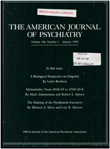Proposed changes in DSM-III substance use disorders: description and rationale
Abstract
The authors describe changes in DSM-III substance use disorders to be included in the revised version, DSM-III-R. Major revisions include removal of the distinction between "abuse" and "dependence" and broadening the definition of "dependence" to a syndrome of clinically significant behaviors that indicate a serious degree of involvement with psychoactive drugs; creation of a new category of "psychoactive substance neuroadaptation syndrome" for individuals whose physiological adaptations to high doses of psychoactive substances did not arise from their own behavior; use of an identical set of symptoms and behaviors to determine dependence on all different classes of psychoactive substances; and provision of a system for rating severity of dependence.
Access content
To read the fulltext, please use one of the options below to sign in or purchase access.- Personal login
- Institutional Login
- Sign in via OpenAthens
- Register for access
-
Please login/register if you wish to pair your device and check access availability.
Not a subscriber?
PsychiatryOnline subscription options offer access to the DSM-5 library, books, journals, CME, and patient resources. This all-in-one virtual library provides psychiatrists and mental health professionals with key resources for diagnosis, treatment, research, and professional development.
Need more help? PsychiatryOnline Customer Service may be reached by emailing [email protected] or by calling 800-368-5777 (in the U.S.) or 703-907-7322 (outside the U.S.).



